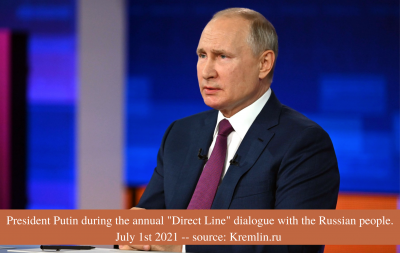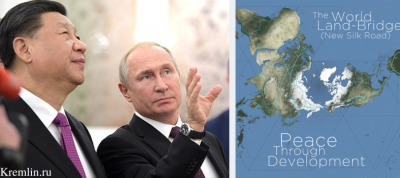July 2 -- Russian President Vladimir Putin: "The period of the unipolar world is gone."

Putin's statement, made on July 1 during his annual session of dialogue with the Russian people, echoes the same sentiment expressed by the Chinese Embassy in London during the G7 summit, which stated that the "days are long gone" when a "small group of nations" can dictate global policy decisions. Putin's dialogue followed an online session with China's President Xi Jinping on June 28, during which the two agreed to extend the Friendship Treaty between them for five years. In their joint communique, they pledged "enduring friendship", based on "bilateral cooperation" in politics, economics and culture, as well as mutual security. Xi stated that the agreement forms the basis for "building a community with a shared future for humanity."
Provocative Probe In The Black Sea
It is precisely this commitment to multilateral cooperation which is driving the promoters of an arbitrary unilateral "Rules-Based Order" in London and Washington to such desperate actions as the deliberately provocative intrusion by the British warship HMS Defender into Russian territorial waters in the Black Sea near Sebastopol on June 23. When the British navy destroyer first crossed into Russian waters, the Russian Black Sea fleet radioed a warning. After waiting approximately fifteen minutes for a response, and receiving none, a Russian border patrol ship fired warning shots. Nine minutes later, bombs were dropped in the path of the ship, which then turned away.
When the Russians immediately denounced this as a provocation, the British Ministry of Defense (MOD) first denied any shots had been fired, calling it an "innocent passage through the Ukraine waters." A spokesman for Prime Minister Boris Johnson then defended the passage, declaring, "The UK does not recognize Russia's claim to Crimea," indicating that the chosen path of the ship had not been so innocent. As to the claim that no shots were fired, a BBC reporter on the ship, Jonathan Beale, contradicted this, confirming the Russian report of warning shots fired. Commenting on the ship's mission, he stated, "This would be a deliberate move to make a point to Russia."
And what was that point? An MOD source responded that it was to assert "its right to freedom of navigation in international waters."
That this was a planned provocation was revealed by the discovery a few days later of a satchel of classified MOD documents at a bus stop in Kent. The documents detailed the planned passage chosen, and confirm that military officials expected that Russia might respond "aggressively." One can assume that this discovery was not an accident, but a "leak" to show that the Brits are actively probing the likely Russian military response to future provocations. Russian Foreign Ministry spokeswoman Zakharova mocked this discovery by quipping, "Why do we need 'Russian hackers' if there are British bus stops?"
But the Russians did not take this lightly, with warnings from various spokesmen, including top military leaders, that next time, the ships passing through Russian waters will be hit. Remarks by President Putin nearly four hours before the incident began, made at the Russian International Security Conference, demonstrate that he was aware that there likely would be operations launched to undermine the small, but significant progress made in the Biden-Putin summit seven days earlier in Geneva. Putin opened his speech by warning that "geopolitical processes are becoming increasingly turbulent despite isolated positive signals. The erosion of international law continues as well."
Putin, Lavrov Clarify The Underlying Issues
In his July 1 dialogue, Putin provided a more detailed answer as to why the gambit was launched. He asked, "What did these provocateurs want to show and what goals did they seek to achieve?" It was staged, he said, "not only by the British, but also by the Americans," citing Russian radar identifying the deployment of U.S. reconnaissance aircraft to observe what Russian "countermeasures to this sort of provocation might be."
More fundamentally, he pointed to the hypocrisy of those who staged the provocation, who speak of democracy, yet reject the choice of the Crimean people to join the Russian Federation. Referring to the tensions which developed when Russia mobilized troops in response to Ukraine's President Zelensky's threat to retake Crimea, Putin said that after he pulled back troops, "They [NATO] showed up on our borders."
Putin reiterated his belief that the action in the Black Sea was a response to the progress made in his summit with President Biden, stating that such "destructive behavior" as military exercises, provocations and sanctions are an effort by U.S.-NATO forces "to preserve their monopoly position at any cost." But, he added, "The world is changing dramatically...The period of the unipolar world is gone."

Russia and China in close collaboration have been "breaking the rules" of the Western war mongering establishment, by offering development and collaboration to the world.
This was the theme of an article written by Russian Foreign Minister Sergey Lavrov, published on June 28, titled "The Law, the Rights, and the Rules." Lavrov detailed the hypocrisy embodied in the concept of an arbitrary Rules-Based Order: "When someone acts against the rules of the West, it immediately responds with a groundless claim that 'the rules have been broken'" and declares the right to act "to hold the perpetrators accountable."
The Schiller Institute's Helga Zepp-LaRouche warned that the defense of the global order by flight-forward actions by military forces demonstrates that "we are presently in a dynamic which, as with the global NATO 2030 plan," intends to establish a "global war machine designed to encircle Russia and China."
Brits Focus On Ukraine, Black Sea
Preceding the confrontation near Crimea provoked by the HMS Defender, that vessel was the scene of the signing of an agreement between the UK government and Ukraine to upgrade the Ukrainian navy. The British pledged to deliver new "naval platforms" and "defensive shipborne armaments," train naval personnel, and build new naval bases in the Black Sea and the Sea of Azov. According to a post on the website GOV.UK on June 23 -- the day of the Defender's intrusion -- the agreement is intended to "help deter shared threats"!
Though discussion of Ukraine joining NATO has been temporarily dropped, such agreements indicate the intent to continue to use Ukraine as a staging ground for east-west conflict. Putin has declared that granting Ukraine membership in NATO would be crossing a "Red Line."
A second incident occurred on June 24, when a Dutch frigate, the Evertsen was met by a squadron of Russian air force fighter jets as it moved toward Russian waters, before turning away. Adding to the tension is NATO's Black Sea naval exercises, Sea Breeze, which will run from June 28 to July 23. Russia's Black Sea forces will be closely monitoring these maneuvers.
The density of provocative activity represents NATO's intent to show "support for Ukrainian sovereignty", as expressed in a communique from the NATO heads-of-state summit in Brussels on June 14. It states that NATO "does not and will not recognize Russia's illegal and illegitimate annexation of Crimea," and backs Zelensky's threats to take back Crimea by denouncing its "temporary occupation" by Russia.
While Putin downplayed the danger that war would result, even if Russian forces sank the HMS Defender, premeditated "accidents" have served as triggers for war before. It should not be precluded that further "probes" will occur. In a statement condemning the "lunacy" of the HMS Defender incident, former UK Ambassador Craig Murray pointed to the obvious, that there is no cause for British warships to be cruising in the Black Sea: "The UK needs to lose its imperial ambitions," he added.
But such imperial ambitions, which were on display at both the G7 and NATO summits, continue to shape TransAtlantic policy towards Russia and China. Events in the Black Sea confirm that the "breathing room" opened by the Geneva summit will disappear, unless the U.S. breaks definitively with the geopolitical imperial plans of the British.





